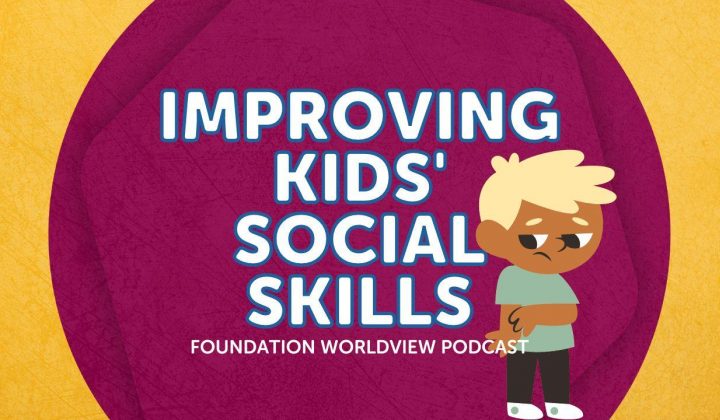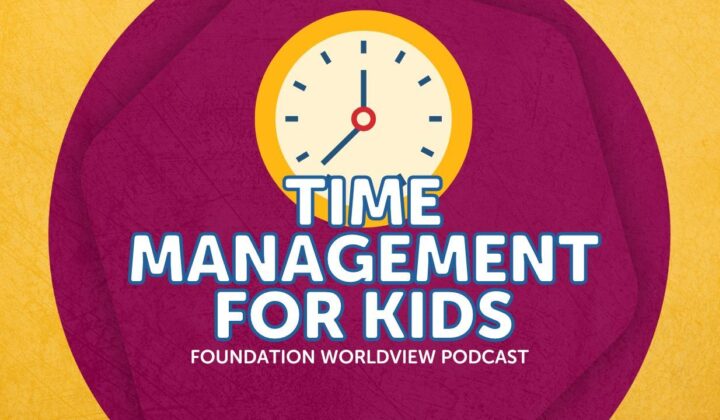Learn more about the journey that led to us equipping kids to carefully evaluate every idea they encounter.
Meet members of our team who have contributed to curriculum development.
Hear from real users of the Foundation Curriculum.
Learn what we believe about God, Jesus, Scripture, and more.
Should Kids Play Video Games?
On today's episode of the Foundation Worldview Podcast, Elizabeth Urbanowicz explores a pressing question for many Christian parents: Should kids play video games? Drawing on insights from brain science, Elizabeth highlights both the potential benefits and risks associated with gaming. She discusses the objectives of relaxation, entertainment, and connection that video games often promise, and examines whether these goals are truly achieved. Elizabeth also outlines three primary dangers tied to screen time, offering thoughtful guidance to parents looking to make informed decisions about video game usage in their households. Tune in for a balanced, informative perspective on one of today's most debated parenting topics.
Transcript
Note: The following is an auto-transcript of the podcast recording.
Hello friends, and welcome to another episode of the Foundation Worldview Podcast, where we seek to answer your questions so that you can equip the children that God has placed in your care to carefully evaluate every idea they encounter and understand the truth of the biblical worldview. I'm your host, Elizabeth Urbanowicz, and I'm thrilled that you've joined me for another episode today. Now, today's question is short and sweet. It says, "should kids play video games?". Really interesting question and a question that I'm sure many listeners have been thinking through.
Now, before we dive down deep into this question, I would ask that if you have found the content of this podcast beneficial that you would like and subscribe to make sure that you never miss a future episode, I would also ask that you consider investing the time in writing a review so that more people can discover this content and we can equip as many children as possible to carefully evaluate every idea they encounter.
Now, for those of you who have followed the Foundation Worldview Podcast for a while now, you know that I have one question that I typically ask at the beginning of most podcasts, and that is "what is the goal?". So as we're thinking through this particular question, "what is the goal?". So as we're thinking through video games, what is the goal of our children potentially being involved in gaming? And so I think from what I know about video games and those I know who are involved in them, I think there is a threefold goal that video games are a form of relaxation, they're a form of entertainment, and they're a way to connect with others. So relaxation, entertainment, and time with others.
So now the question is, okay, so if that's the goal in playing video games, does video gaming actually meet this goal? And I would say our first goal of relaxation, I think yes, video game can be video, gaming can be a relaxing activity for people. I personally do not find it relaxing. I am not into gaming, but I know others who do find it as a way of relaxation and enjoying leisure time.
Then entertainment. Is video gaming entertaining? Like yes, it is entertainment. Another word for entertainment is amusement and a-, the prefix, a- means without, mused means to think. So, amusement means without thinking. And so anytime we're entertained or we're amused, we're basically shutting off our minds and just relaxing and enjoying something. And so that is something that video gaming does. It helps people turn off their brains and do something that's a little bit mindless.
Then the third thing is video gaming, actually providing connection with others. Video gaming can be an activity that's done among friends, whether it's done among friends, sitting next to one another on the sofa, or whether it's done online with friends who are just online with us playing on the same team. So I would say yes, video gaming can provide or meet those three goals. It can meet the goal of relaxation, entertainment, and a common activity among friends.
Now, the same three things could be said about other things in our society, athletics, the arts, different types of non screen-based activities. And so with all activities that are provided for relaxation and entertainment, there needs to be certain limits placed on those because we cannot spend our entire lives relaxing and being entertained, even though our culture would very much like to do that. That is not how God designed us. When you even think about the 10 Commandments, the fourth commandment on six days, you shall labor and do your work, and the seventh is to be holy to the Lord. Now, when you're thinking about that, it's like, yes, one day is to be devoted to the Lord. Well, what does that tell us about the six other days? That those days are to be invested, actually, in working. That work is a biblical command.
So we were designed to work. So in any activity, that's a leisure activity. There needs to be certain restrictions placed on that activity so that we're aligning with God's design for us. I think with video gaming because it is a screen-based form of leisure, that there are different dangers with screens that are just inherent with screens that are not inherent with athletics, the arts or other non-screen based activities. So therefore, I think that as parents, we're going to have to place greater limitations and protections over our kids if they are going to be involved in gaming. Now, if you've listened to other Foundation Worldview podcasts, you've heard me talk before about three inherent dangers with screens. And so we're just going to go through those again briefly, that there's three dangers that come along with any screen-based form of entertainment.
And it's also true of video gaming, that the first danger is hindered brain development. That when we are watching a screen and are engaged in anything on a screen, whether it's gaming, whether it's social media, whether it's a show, there are certain regions of our brain that are left out that are circumnavigated and aren't used during this time of amusement. And when these regions of our brain are not used for long periods of time, what happens is the brain prunes away the connections in that part of the brain so that there's room for the other connections that are used more frequently. And specifically when we're talking about screen time, the area of the brain that is not typically used is the prefrontal cortex. And the prefrontal cortex is the portion of the brain that's actually used for reasoning, for executive functioning, which means regulating emotions, thinking rationally, managing time, organizing different things in life.
And so if we are allowing our children to game for multiple hours a day, we're actually hindering their brain development because brain development does not stop until the age of 25. So if we're letting this happen at the age of 4, 6, 8, 14, 16, 18, we're really hindering their brain development. And this is especially dangerous for boys because in general, boys tend to struggle more than girls with executive functioning. And so boys who already have a greater risk of struggling with executive functioning, they're put at an even higher risk of struggling with this and not being able to manage their time well and not being able to maintain self-control, to regulate their emotions, to engage in relationships. And so we need to be careful that we're not allowing our kids to just mindlessly game for hours a day and just really hinder their brain development.
When we're talking about younger children, when this happens with younger children, what the effects of it that we tend to see is children who are more dependent on their parents for basic things, such as picking out the clothes that they're going to wear, keeping things organized in their room, actually having their food cut up for them. So if we have a child who's nine or 10 years old and we're thinking, you know what? I still need to pick out his or her clothes every day, or you know what? I'm cutting up her food at the dinner table, or you know what I'm having to do all of the organization in his or her room, that's probably a big sign that we need to pull back on screen-based forms of entertainment. So that's the first inherent risk, which is hindered brain development.
The second risk is chemical addictions. That video games are designed to give the brain large amounts of dopamine. And dopamine is a pleasure chemical. And with the way that God has designed our brains, he's designed our brains to receive hits of dopamine at different times. When we're enjoying food that's really tasty, we get a hit of dopamine. When we're involved in physical activity that's helping our heart grow stronger and our lungs, we're getting a hit of dopamine. Within the marriage covenant, when a husband and a wife engage in sexual intercourse, they're gaining hits of dopamine and these hits of dopamine were designed to be good things. But as with anything, if we take a good gift from God and we abuse it, that good gift ends up enslaving us. And with video gaming, video games are designed to give kids hits of dopamine at just the right time to keep them coming back.
Now, I already explained that I'm not a gamer, so I'm not familiar with a whole lot of the games that are created today. But even just thinking back, the games in the nineties, like the Mario Brothers games, and when Mario was going across the screen and mushrooms would come up, or coins would come up, they would come up at just the right time to give little hits of dopamine so that kids would become addicted to that. And what happens with video games and other forms of screen-based entertainment is that our brain gets larger hits of dopamine than God designed us to get. And so when our brain is flooded with dopamine, it's a really good feeling, but our brain realizes, "oh, wait, this is too much. We weren't meant to get this much dopamine". So what happens is the dopamine receptors start to get killed off that in order to get that same level of pleasure, more and more dopamine is needed, but it's just this losing cycle because as our brain gets more dopamine, it continues to kill off more of those dopamine receptors.
So that means if we're creating this chemical addiction for our kids in gaming, things that were meant to be dopamine hits like food and physical activity and sex within the marriage covenant, they're not going to receive the same amount of pleasure from those activities as they would have, otherwise, if we had actually protected them from this type of chemical addiction. So chemical addiction is the second inherent danger.
The third inherent danger with gaming and any form of screen-based entertainment is isolation. Now, as I already mentioned, kids can play video games together side by side on the sofa, and that can be a helpful thing in some ways, for forming relationships. But a lot of gaming is done in isolation, even if it's done with people online and friends in person who are just online, in-person interactions are completely different than online interactions. So we're not actually helping them forge deep relationships when most of their interactions with friends are online.
And as I've mentioned in previous podcasts and webinars, research has found that screen usage, whether it's video gaming or watching shows or social media, is always associated with an increased risk of unhappiness, anxiety, depression, and suicide. Now, don't misunderstand me. I'm not saying that if your child spends multiple hours a day gaming, he or she is going to be unhappy, anxious, depressed, and suicidal, but his or her risk for those four things significantly increases the more time he or she plays video games or spends online just surfing the web or watching shows or on social media.
If you'd like more information just on the dangers of screen over usage with children, as well as what happens in the brain chemistry when screens are used, and how to really help your kids not become addicted to screens, I highly recommend that you check out the organization ScreenStrong. They have a number of different resources that can just help you understand more about the brain chemistry behind kids' brain development and screens, as well as help you make wise decisions for your family.
So my conclusion for this is that sometimes some gaming can be okay. It can meet those three goals of relaxation, entertainment, and time with friends. Yet as with everything, everything that's good, there needs to be certain boundaries in place. And particularly so with gaming because it's a screen-based activity. And there are those three inherent risks of hindered brain development, chemical addiction, and isolation.
So just to put some numbers on this, if your child is spending more than an hour a day gaming, that's really dangerous because they are becoming more and more chemically addicted, and their brain development is being affected by this screen usage. In the moment, our kids do not appreciate the boundaries that we establish for them because in the moment, they really can't understand those boundaries.
I think back to even my own growing up time and my mom was dead set against having any video games in the house. Eventually, my brother, sister and I were able to talk her into letting us pool our finances and go out and buy a Nintendo 64. And so she let us do that. And the way that we were allowed to have time to play the Nintendo 64 was that we had to do our chores for a whole week. And at the end of that week, we would get a little index card that had the word or the letters, sorry, not letters, numbers, the numbers 20 on it, and we were allowed to then turn in that card for 20 minutes of video game time.
Now, we were allowed to pool our time together as siblings for up to an hour so we could pool our time together and play for up to an hour. But it took us a whole week to earn that 20 minutes of gaming time. And I can tell you that my brother, my sister and I are very grateful for the limits that my parents put on that screen time and that they really saved us from becoming addicted to gaming. And as we're thinking about discipling our kids, we're always wanting to ask ourselves with everything that we do, is this helping my child become a faithful disciple of Jesus? And if it's not, it's something that we want to make sure that we are limiting in a very wise and very developmentally appropriate way.
Well, that's a wrap for this episode. But if you have a question that you would like for me to answer on a future Foundation Worldview Podcast, you can submit that by going to FoundationWorldview.com/podcast. As we leave our time together, my prayer for you as always is that no matter the situation in which you and the children God has placed in your care, find yourselves, you would trust that God is working all things together for your good by using all things to conform you more into the image of His Son. I'll see you next time.
Related Posts and insights

Stewarding Your Family's Time Better
Join Elizabeth Urbanowicz as we consider today's question, "how do we as parents navigates sports, hobbies, etc, to steward our family's time better?"

How to Improve Social Skills for Kids
In this episode of the Foundation Worldview Podcast, host Elizabeth Urbanowicz engages listeners with the question, "How do I help my kids develop good social skills?" Diving into her experiences as a teacher and the challenges of digital distractions, she offers critical insights into the importance of teaching children basic social skills. By the end, listeners are reminded of the ultimate goal: to equip children to love God through loving others well.

Time Management for Kids
Today's question says, "It seems like kids these days have too much idle time. What are practical ways to teach our children good time management?"





